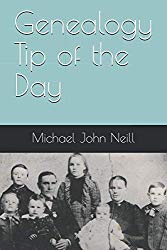Most genealogists should know how people reproduce. But sometimes we forget that people don’t have to be married for that to happen. In some time periods and in some locations, having children outside of marriage was more common than a person might think. Two siblings of my great-great-grandfather in Thuringen, Germany, had several children before they were married (1830-1840 era). They were apparently in a long-term relationship with the fathers of their children as baptismal records for the children indicate that both sisters had their children with the same father.
Not the exact same father (one needs to be careful how one phrases things). One sister had her children with Mr. B and the other sister had her children with Mr. S. The sisters eventually married their respective fathers of their children.
Why does this matter? One reason is that sometimes the children used their mother’s surname as their last name and sometimes they used their father’s surname as their last name. That was confusing to me until I learned the marital history of their parents.









7 Responses
It cost money to get married. Some had to wait until they had the money. It’s also a question whether the children were “legal” or if they were made legal retroactive to the marriage.
OFTEN THEY HAD TO WAIT SOME TIME FOR THE CIRCUIT PREACHER TO COME TO THEIR AREA AGAIN. SO THEY GOT TOGETHER ANYHOW AS HE MIGHT NOT COME AROUND AGAIN FOR A COUPLE OF
YEARS.
In some places yes. In other not. The family in the example lived in Germany and there were plenty of pastors–and their local church had one during the time in question–he baptized the children. On the frontier this could sometimes be an issue.
I’ve heard that in Germany, it cost a lot to get married, so many people lived together without the marriage for a while, while saving up for the marriage. How they managed to do that AND have children before the marriage, I don’t know, but they managed. In some cases, the father would claim the child and a notation would appear on the birth record about it, but the child would be listed on the record under the mother’s name because there had not been a marriage at the time of the birth. So the same child could have birth record with mother’s surname and marriage record with father’s surname later on down the line. Sometimes, the father did not legitimize the child even if he married the mother. Not sure what was up with that, but I’ve run into both cases while doing my research.
In the two cases referenced in the post, one couple never married and had children between 1827 and 1837. The other couple married in 1834 (the first child was born in 1831) and had at last six more children.
An example of the first interpretation of “with the same father” meaning one man: In one of my ancestral lines, two women who were aunt (b. 1860) and niece (b. 1858), living in the same area had, respectively, 10 children and 9 children with the same man between 1880 and 1899. As far as I can find, he never married. Story is that the two women met in town one day and proceeded to have a “cat fight”. However, both survived and raised their families. The children, with one exception, bear their father’s surname and I have been in contact with one of their descendants..
F Warren Bittner had an excellent article in the National Geographical Society Quarterly 100 (September 2012 165-187) that discussed one family’s record trail of trying to get the approval of the church, town council and district court to marry. This was in Bavaria in the second half of the 18th century. Bavarian law set tight marriage restrictions so the town would not have to be responsible for the family/children if the father was unable to make a living wage. This was one of the reasons the family immigrated to the new world. Just because this couple could not get permission to marriage did not mean they didn’t have children.